-
Categories
-
Pharmaceutical Intermediates
-
Active Pharmaceutical Ingredients
-
Food Additives
- Industrial Coatings
- Agrochemicals
- Dyes and Pigments
- Surfactant
- Flavors and Fragrances
- Chemical Reagents
- Catalyst and Auxiliary
- Natural Products
- Inorganic Chemistry
-
Organic Chemistry
-
Biochemical Engineering
- Analytical Chemistry
-
Cosmetic Ingredient
- Water Treatment Chemical
-
Pharmaceutical Intermediates
Promotion
ECHEMI Mall
Wholesale
Weekly Price
Exhibition
News
-
Trade Service
Weight gain is a common complaint among middle-aged women, with more than two-thirds of middle-aged U.
S.
women exceeding the ideal weight threshold
.
Metabolic changes associated with aging promote weight gain in both men and women, but women face additional challenges
due to menopause.
At the North American Menopausal Association (NAMS) Annual Meeting in Atlanta, Oct.
12-15, a presentation will discuss the effects of age and menopause and strategies for
weight control.
It's a simple fact of life – the body's metabolic rate decreases with age because of a decrease in muscle mass and a decrease
in the activity of brown adipose tissue.
Sleep disorders and mood disorders, which may be associated with the menopausal transition, can also interfere with the adoption of a healthy lifestyle, further promoting weight gain
.
The loss of ovarian hormones after menopause leads to changes in the composition of the body, a decrease in lean body mass, an increase
in visceral fat mass.
In addition, changes in the gut microbiota associated with menopause promote midlife weight gain
.
All this added weight can worsen hot flashes while increasing a woman's risk of cardiometabolic diseases such as type 2 diabetes, high blood pressure, dyslipidemia, and coronary artery disease
.
Obesity also increases a woman's risk of cancer, including breast and endometrial cancer
.
Despite popular diets and over-the-counter supplements claiming to burn fat, the most important intervention for weight loss and weight preservation remains calorie restriction
.
While physical activity is not as effective as dietary interventions in initial weight loss, physical activity plays a vital role in maintaining weight after initial diet-induced weight loss and has a variety of other health benefits
.
Weight loss drugs are available, but there are issues such as
cost, interactions with other drugs, adverse effects, and possible long-term toxicity.
In extreme cases, bariatric surgery can be a very effective option, but ultimately, ongoing behavior modification is necessary to maintain long-term results
.
While hormone therapy should not be used for weight management in middle-aged women, when used to manage troublesome menopausal symptoms, it can improve body composition
by redistributing visceral fat to lower body fat stores.
Dr.
Ekta Kapoor of the Mayo Clinic Center for Women's Health will discuss midlife weight gain at the NAMS Annual Meeting, focusing on the causes of weight gain in middle-aged women and their latest ideas
on how to fight back.
"Without an active effort to eat a healthy diet and be physically active, weight gain is an inevitable thing for
middle-aged women.
Women entering menopause must know this and be familiar with practical tips for preventing and controlling weight gain," says
Dr.
Kapoor.
"There's no doubt that women face tough struggles with weight gain as they age and transition to menopause, but that doesn't mean there aren't ways to help them with that
.
The report promises to provide some valuable insights that healthcare professionals can leverage when providing weight management recommendations to menopausal patients," said
Dr.
Faubion, medical director of NAMS.







